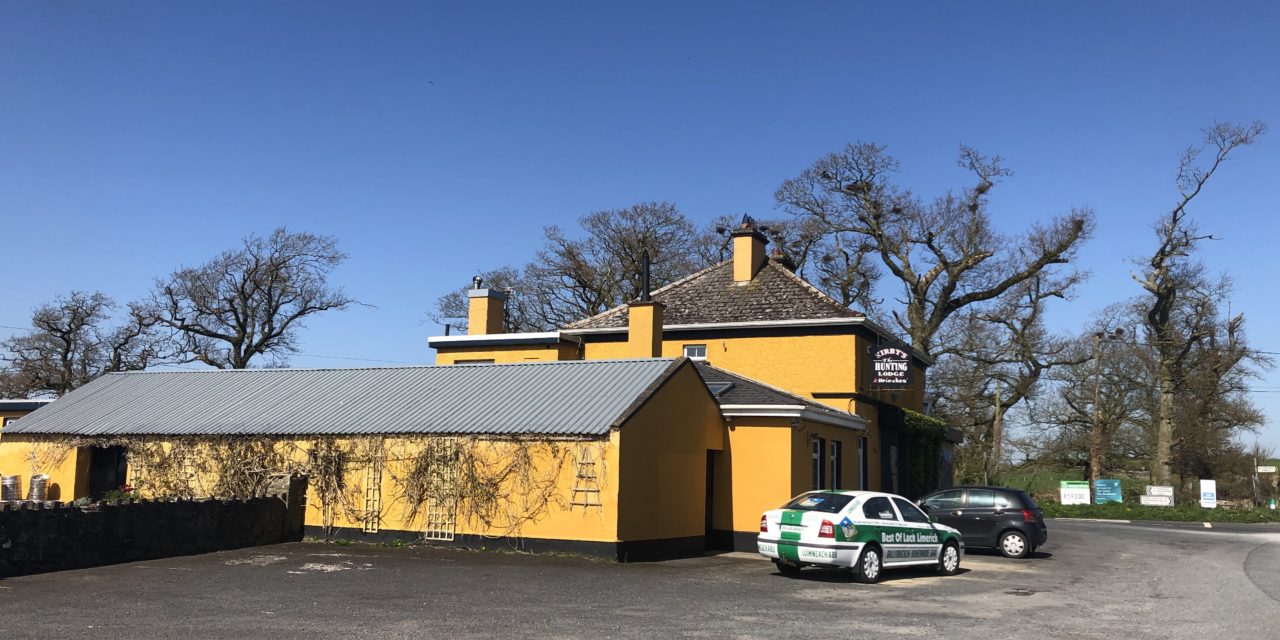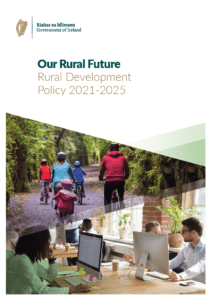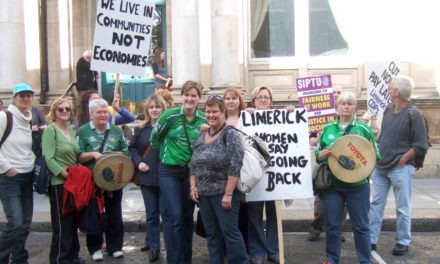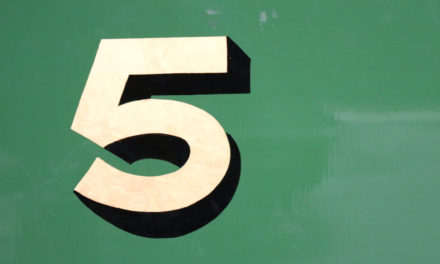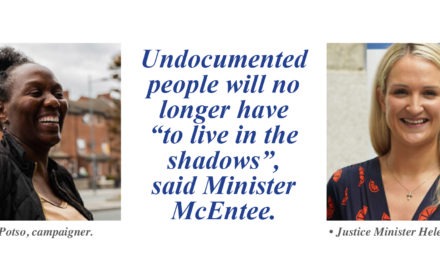Pat Kennedy urges Government not to allow its plans for the use of pubs as community spaces to get stalled by bureaucracy.
BY GRACE BARRETT
Launched this week, ‘Our Rural Future’ published by the Department of Rural and Community Development is an ambitious 5-year strategy featuring 150 commitments to develop rural areas, including plans to turn vacant properties into remote working hubs and the use of pubs as community spaces.
For Pat Kennedy, the plans held a sense of familiarity. In 2019, he had written an Op-Ed for Changing Ireland, outlining precisely how communities across Ireland could be in a position to develop a network of 800-plus innovation hubs by using pubs as the bricks and mortar. These ‘pub hubs’ could operate as pubs by night and community hubs by day.
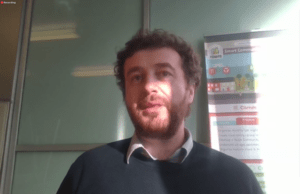
• Pat Kennedy speaking at the launch recently of a new community website for Cootehill, Co. Cavan. He was the first we know of to push the idea of pub hubs, now part of the Government’s plan for rural Ireland.
He believes that the sooner there is movement on this the better. The proposal – number 94 in the new plan – was picked up this week by international media on both sides of the Atlantic, including the New York Times and the BBC. Pat has possibly thought through the idea more than anyone else.
Q – So as this idea developed, and you published your thoughts about it, do you think the Government then stole your idea?
(Laughs) “No one has really said it’s my idea, they might say it’s from somewhere else, it’s hard to say with these things. But it makes complete sense, so I’m more than delighted to see it happen.”
“I got the idea at an ERDN (European Network for Rural Development) event in Brussels, where they were talking about community spaces. I was sitting with an Austrian guy, and I said “What they should do is convert the pubs in Ireland into community spaces”, and he burst out laughing. And I was like “What, you shouldn’t be laughing, that’s a perfectly good idea!”
“The pub has been the centre of the community for so long. And it’s really important that there’s that inter-generational mix within a community. Pubs are the mixing pot where ideas get shared.”
Q – What do you hope to see in how this plan is put into action?
“What I hope happens is that they (the Government) realise their current asset and add to it. The Government has an awful tendency sometimes to think the solution is throwing money at something. Absolutely, money is required to do lots of things. But sometimes, it is not,” he says.
“Of course, investment will be needed to improve broadband and Wi-Fi in these areas, but there’s no need to wait to get much of this happening ASAP. When Covid lifts, this can be something the country is ready for. Let’s not wait until they have a big consultation, write another report, then assign a 10 million budget, and then have a grants programme… All of a sudden there’s two or three years until this gets legs. This can get legs in weeks. It doesn’t need years to get legs.”
Mr Kennedy is the owner and CEO of digital community platform eTownz.
“We build tools for community planning and community management. We’re always looking at community assets, community challenges, community projects and community goals and so forth,” he says.
Pub hubs are a perfect fit, as he sees it, because most pubs only really function from 6 or 7 in the evening until midnight, and the community hub spaces can operate during traditional office hours from 9 to 5.
“Obviously, the insurance is covered, because the building is insured for the entire day. And you have seats, tables, etc. We’ve got a place where you can receive mail and sign for parcels. Many pubs already have Wi-Fi.
“The more I played with the idea, the more I thought this is pretty obvious. And that was pre-Covid – now the pubs are all in trouble.”
Q – How do you think we could see this plan for pub hubs take root quickly in communities?
“I’d like to see a simple audit undertaken of pubs. It could be a self-audit, done online, and there we go, we’ve got a profile of every (interested) pub in the country, and then we profile what they’ve got.”
Q – As pubs are licensed to sell alcohol, do you see any conflict between them acting as community spaces and pubs in the more traditional sense?
“I think they could absolutely exist side by side. Many years ago I went to Belgium for a weekend, and while I was there, in a pub, two on-duty police officers came in, and got a small drink for themselves, and went on their way. We just think in Ireland that having a drink means you’re going to get drunk and you’re going to fall home,” he says.
“We need to measure capacity on a case-by-case basis and that’s why we need this profiling. Consider the pub as a mini community in itself. Let’s do an audit of this community, this pub.
So the pub might have a bar, a lounge, a dining area. Give each of them a timetable, and look at their adaptability. What simple movements of furniture and so forth could change this space into a training room?
“You can have a pub where a couple of lads can go in and drink at the bar, but back in the lounge there could be someone having a training course with ten different people, and then in the next space over, you have someone having a technical meeting with people in the States, and so on. They can absolutely all exist side by side.
“With a simple audit, that can be organised for people. Pubs can be trained to re-imagine their space as community assets, and how they’re going to be leveraged.
“And piece by piece you can audit the community to see what they want. Ask the GAA, ask the local drama club, ask the local parent’s association: ‘If you had this space, if it was entirely yours, how might you use it?’ They mightn’t necessarily get exactly what they want, but it gets them thinking – ‘Oh, maybe we could do this and this on the weekend, or maybe once a month’.
“Once you get that profile of opportunities, then you can play with your calendar and see how that might all mix in together.”
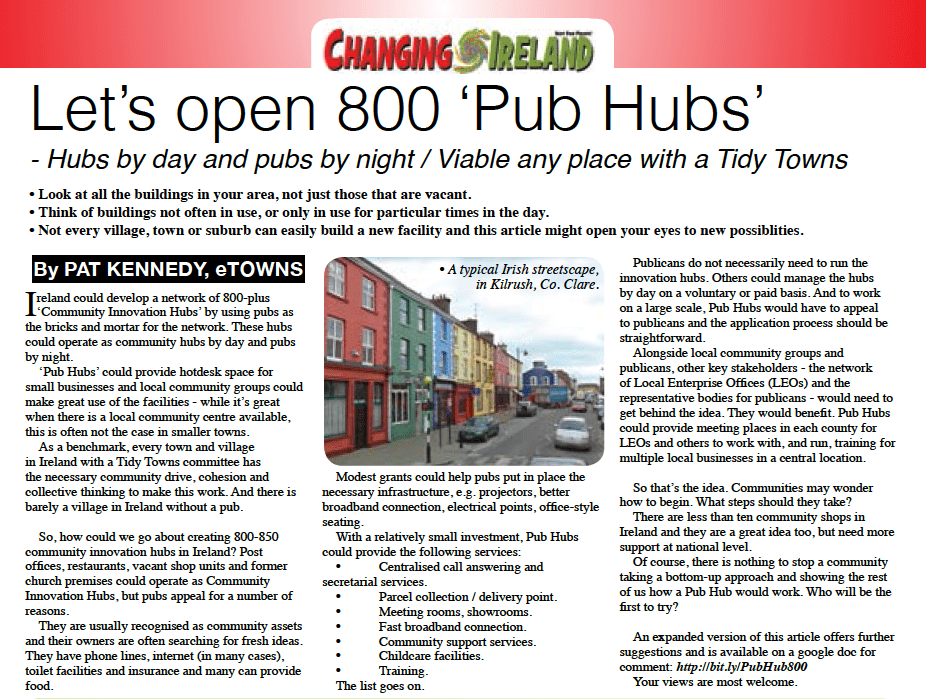
• The original article by Pat Kennedy as published in August, 2019.
Q – How do you think remote working hubs and pub hubs can answer to the problem of depopulation in rural communities?
“I’ll give you an example. We were down in Carrigaholt many years ago running a community planning workshop. And the people there were saying the big problem there was depopulation. And they were asking, ‘How are we going to get our kids to stay here?’,” he says.
“Someone from the back of the room stood up and said, ‘Sorry, you mightn’t know me, I’m here from overseas with five others here and we’ve actually been living in Carrigaholt for five years. We find it to be one of the best communities in the world to be living in.’
“To address the depopulation issue is not just about stopping your kids from leaving, because sometimes they want to leave. Sometimes they want the big smoke. Sometimes they don’t want to come back ever, or maybe not for next 20 or 30 years.
“Ireland is a phenomenally beautiful place. People come here for its people, not to kiss the Blarney Stone, really. Invariably you look at results of people surveyed that visit here, the thing is they love meeting the people. So you could very easily get a situation where there’s no end of people who are travelling around here while working.
“You could go stay in B&Bs and live in Carrigaholt or Kinsale or wherever for three weeks, and then go up the road and live in Galway for another three weeks. Those digital nomads are real, they exist. With the advent of Covid, that’s going to become way more real. So we might as well set ourselves up.
“Pub hubs could become a lovely selling point. Here’s a map of a network of 500 places. It’s a fantastic offering. I think it will provide a really good dimension to our tourism offering. I think it will potentially bring a lot of opportunities.”
You can read the full Government report “Our Rural Future” here.

